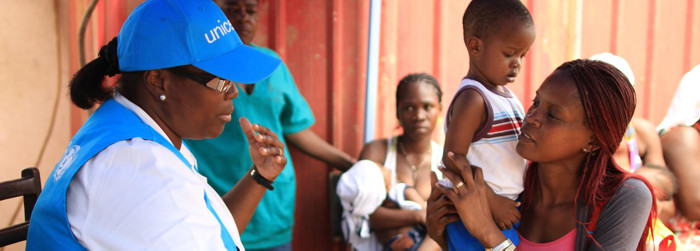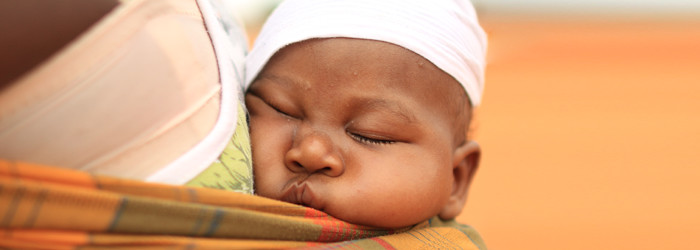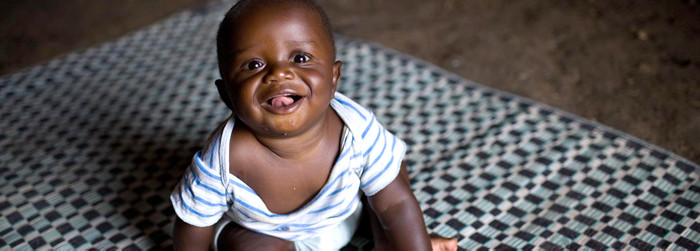JOIN OUR EMAIL LIST
Sign up to receive email updates about UNICEF’s work for every child. Get a closer look at UNICEF programs in action, hear about emergency response efforts, and learn how you can help children. You can unsubscribe at any time.

Clerrsio is 17 months old. He has arrived with his mother Albertina at the pop-up vaccination clinic in the municipality of Kalumba Kiashi, on the outskirts of Luanda. The clinic’s director, Paula Campos, greets Albertina and the other mothers before giving them a short talk about the importance of vaccinations. She reminds them that their child’s yellow vaccination card is an important record to ensure that their child is fully immunized against preventable diseases. Albertina has heard many of these messages before, but she doesn’t mind. She is convinced that Clerrsio is healthy because he has been immunized.
“I heard on the radio that there was a measles outbreak in this area,” Albertina said. “Clerrsio has been immunized, so I’m not worried.”
Clerrsio sits quietly on his mother’s lap while some of the other babies get their needles or drops of polio vaccine. When it’s his turn, clinic workers review his yellow card, weigh and measure him. He’s up to date on his immunizations and his height and weight indicate that he is developing normally. When he was much younger, Clerrsio had malaria. Now the whole family sleeps under an insecticide-treated bed net at home. Albertina and her husband have two other children: a 10 year old boy named Cleiton and a 7 year old named Cielia.
“When I met my husband, we decided if we were blessed with children, we would name them all with a ‘c’,” she smiled.
“UNICEF does good work,” Albertina said. “They work in health centres and they work with children.”

Maseo is the youngest of mother Rosa’s three children. All boys. Maseo is four months old and is waiting to be weighed, measured and vaccinated at a UNICEF-supported vaccination site in the municipality of Kalumba Kiashi, on the outskirts of Luanda. Vaccinations have become even more important here since news of a measles outbreak in this neighourhood and cholera outbreaks around the country have been making the news. Rosa knows from experience that immunizations are important in protecting her children.
“I feel like my children don’t get as sick as other children,” Rosa says.
Not everyone in her community is aware of the importance of immunization in preventing disease.
“We don’t talk about it,” she said. “Maybe we should.”
“He has a card,” she says pointing to Maseo’s yellow vaccination card. “This helps us keep track of when we need to come again.”
Reaching the hardest to reach in Angola. Evidence of the intense civil war that ended in 2002 is still visible throughout much of Angola. Standards of living are low for much of the population and life expectancy and infant mortality rates are among the worst in the world. Employing a strategy called RED (Reach Every District), UNICEF is working with local organizations, as well as traditional and religious leaders to map out and reach areas with high numbers of missed children. The Reach Every District (RED) strategy has made progress but has thus far reached only 97 of 164 municipalities (2010). Your contributions will help take us the rest of the way.

Gilbert barely notices that he’s being vaccinated. He’s just five months old. He smiles, secure in his mother's embrace – and it’s easy to forget that he was born in an insecure world.
Gilbert and his family are refugees. He and his mother Valerie have fled the civil war in the Democratic Republic of Congo. Now they live together with Gilbert's three siblings in a remote village in Likouala, in the province of Brazzaville, across the border in the Republic of Congo.
Valerie wants to give her son the best future she can in such unsettled circumstances. That’s why she’s brought him to be vaccinated by a team of UNICEF healthcare workers.
In just a few seconds Gilbert is protected against six of the most dangerous diseases that might affect him.
Valerie still worries when she thinks about her children’s future, but she’s happy to know that Gilbert now has a better chance of growing up to live a healthy life. Around the world, there are millions of children who lack this vital protection.
Donate Today »